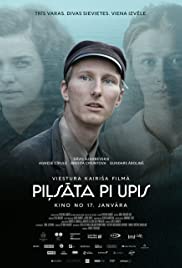
THE SIGN PAINTER
Latvia, 2020, 110 minutes, Colour.
Davis Suharevskis, Brigita Cmuntova, Agnese Cirule, Gundars Abolins
Directed by Viesturs Kalriss.
This is a Latvian film looking back 80 years and more on the history of Latvia, it attempts to be an independent country, the domination of the Soviet Union, the Nazi occupation in the early 1940s.
The focus of the film is a young man, a sign painter in a city built on a river in the northern Baltic. His ambition is to be a painter and we see his efforts and some of his success. He is also attracted by the modern-minded daughter of the Jewish store keeper where he buys his paints. He also encounters a visitor who settles in the city with her pharmacist father and who sets her eyes on him.
The film shows a lot of the detail of ordinary life in the city at the time, and its self-assertion.
However, it shows the presence of Russian authorities, the KGB (with the young Jewish girl attracted to one of the offices and becoming part of the organisation). Some of the locals flee the town, want to join the partisans in the countryside, are attacked by Russian troops. The sign painter and the girl find themselves back in the city, the Nazis having taken possession of the city (and their friend from childhood now in charge). The painter continues with his signs, now renaming the streets in Nazi letters, eventually marrying his girlfriend, her pregnancy and miscarriage, painting the Jewish store owner who encourages him to go to London to develop his artistic talents, seeing the Jews rounded up and X are caught.
There is a dramatic climax at a social, the sign painter and his wife present, a German concert with singing, and, outside, some partisan activity and shootings, leading to the sign painter trying to escape.
The film is rather episodic, leaving the audience to fill in some of the details. However, it is an opportunity to learn something about the history of Latvia in the early 20th century.
1. The title, the focus on And yes? His place in the town, painting signs, illustrations of his work on buildings, on the boat, street signs, for the Soviets, for the Germans? Yet his wanting to be a painter, seeing him at work, his school, his portraits?
2. The English title, City by the River, the city itself, extent, homes, buildings, shops, the roads, the church and its interiors? Offices? The role of the River, the boats?
3. Latvia, the 1920s and 30s, Latvia as a nation, people, the Russian influence and dominance, the German influence and dominance? These are the languages? And the place of the Jews?
4. And this, at work, the attraction to Zisele? Courting her? Her reactions? The sequences at the river, Andreas? Painting, dropping the brush on Naiga, the skirt, sells reaction? Francis and his relationship with his father? The boat? Sis else father warning him off, her fiancee in Prague? His buying the paints from Burnstein?
5. Ordinary life in the town, and his and the attraction to The cell, the encounters with no eager, her attraction, her father in the pharmacy, Dances and his work? Painting her portrait? The romantic emotions?
6. The political background, moved towards independence, the Soviet influence, the KGB, presence in the town, the rounding up of the Jews, Burnstein and his being ousted from his shop? Sell and her reaction against her father, her reading, the book Free Love, her attraction to the Russian official, joining the KGB, her work? The Soviet influence, the reaction of the locals, forming resistance?
7. The effect on And sis, with no eager, Gisele arranging for them to escape? And sis and his painting of Burnstein’s portrait, Burnstein and the money, the gold coin for the marriage? And the reference to artists in London?
8. And sis and no eager fleeing, on the countryside, no eager and the milk from the goat, finding the partisans, the Russians, the shootings and deaths, Callis? No eager hiding? And sis and his being taken on the train? The deaths? Answer is taken back into the city?
9. Life in the city, his painting signs, meeting no eager again, the visit to the church, the reaction of the priest, their eventual marriage? The house – and sis Elle, fleeing, there hiding her in the Attic, washing, meals for her, her surviving? Especially with Andrea is visiting the house?
10. The coming of the Germans, the occupation, Andreas in charge, his ideology? The sign painter and his work, German names, the streets? And sis and no eager surviving, pregnancy, the miscarriage? The socials, dressing up, the German songs…?
11. The Jews, and sis watching the procession out of the city, Burnstein, the going to their deaths? And sis and his talking with Burnstein, especially about the cell and her rebellion?
12. And sis, his disillusionment, out in the square, the vehicle exploding, the partisans? Sis Elle being shot, naked with the gun?
13. And sis, on the boat, the partisans, their being attacked from the shore, everybody dead?
14. The boat in the floating refugees, and sis and his arm wound, the helping him, going out to the open sea… To Sweden? To freedom?
15. A Latvian/National perspective on the country, the people, Baltic ethos, the German influence, the Russian occupation, the war?